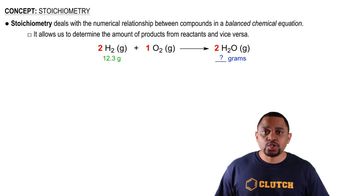A heliox deep-sea diving mixture contains 2.0 g of oxygen to every 98.0 g of helium. What is the partial pressure of oxygen when this mixture is delivered at a total pressure of 8.5 atm?
CH3OH can be synthesized by the reaction: CO(g) + 2 H2(g) → CH3OH( g) What volume of H2 gas (in L), at 748 mmHg and 86 °C, is required to synthesize 25.8 g CH3OH? How many liters of CO gas, measured under the same conditions, are required?

Verified Solution
Key Concepts
Stoichiometry

Ideal Gas Law

Molar Mass

Consider the chemical reaction: C(s) + H2O(g) → CO(g) + H2(g) How many liters of hydrogen gas are formed from the complete reaction of 15.7 g C? Assume that the hydrogen gas is collected at a pressure of 1.0 atm and a temperature of 355 K.
Consider the chemical reaction: 2 H2O(l) → 2 H2(g) + O2(g) What mass of H2O is required to form 1.4 L of O2 at a temperature of 315 K and a pressure of 0.957 atm?
Oxygen gas reacts with powdered aluminum according to the reaction: 4 Al(s) + 3 O2(g) → 2 Al2O3(s) What volume of O2 gas (in L), measured at 782 mmHg and 25 °C, completely reacts with 53.2 g Al?
Automobile air bags inflate following a serious impact. The impact triggers the chemical reaction: 2 NaN3(s) → 2 Na(s) + 3 N2(g) If an automobile air bag has a volume of 11.8 L, what mass of NaN3 (in g) is required to fully inflate the air bag upon impact? Assume STP conditions.
Lithium reacts with nitrogen gas according to the reaction: 6 Li(s) + N2(g) → 2 Li3N(s) What mass of lithium (in g) reacts completely with 58.5 mL of N2 gas at STP?
